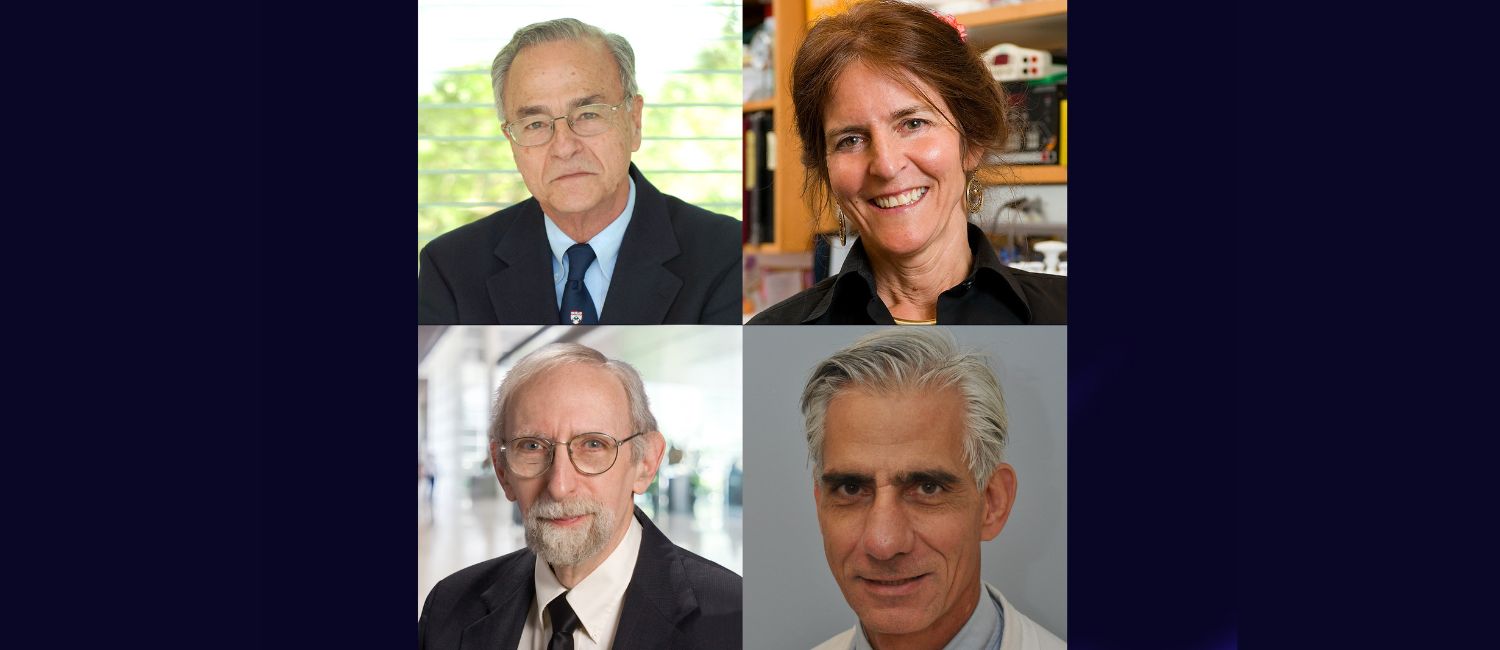 This year’s recipients of the Helen Keller Prize from Penn are (clockwise from top left): Gustavo Aguirre, Jean Bennett, Albert Maguire, and the late Samuel Jacobson. (Images: Penn Vet and Penn Medicine)
This year’s recipients of the Helen Keller Prize from Penn are (clockwise from top left): Gustavo Aguirre, Jean Bennett, Albert Maguire, and the late Samuel Jacobson. (Images: Penn Vet and Penn Medicine)
Faculty from the School of Veterinary Medicine and Perelman School of Medicine were honored at the Association for Research in Vision and Ophthalmology meeting in New Orleans.
Four faculty from the University of Pennsylvania have been named recipients of the Helen Keller Prize for Vision Research by the Helen Keller Foundation in partnership with BrightFocus Foundation for their contributions to vision science.
Gustavo D. Aguirre from the School of Veterinary Medicine and Jean Bennett, Albert M. Maguire, and the late Samuel G. Jacobson from the Perelman School of Medicine (PSOM), together with T. Michael Redmond of the National Eye Institute, were presented as Helen Keller Laureates at the annual meeting of the Association for Research in Vision and Ophthalmology in New Orleans.
According to the award’s mission statement, the prize is in keeping with “Helen’s lifelong quest to ‘hasten the day when there shall be no preventable blindness.’” The Prize is given for “research excellence as demonstrated by a number of significant research contributions to vision science during the course of a career or for a single research contribution of exceptional importance to vision science.”
The Penn recipients:
Gustavo D. Aguirre is a professor of medical genetics and ophthalmology at Penn Vet. His internationally renowned research during more than four decades has investigated the genetic basis of a variety of inherited vision disorders, including Leber congenital amaurosis (LCA), Best disease, achromatopsia, and retinitis pigmentosa. Aguirre earned his Ph.D. and V.M.D. at Penn. His work on novel gene therapy approaches to treatment, which deliver a functional copy of a gene that is otherwise dysfunctional directly to the affected cells in the eye, has restored vision in animal models of X-linked retinitis pigmentosa and LCA. Aguirre, who earned his V.M.D. and Ph.D. from Penn, is a fellow of the Association for Research in Vision and Ophthalmology and a member of the National Academy of Medicine, College of Physicians of Philadelphia, and American Association for the Advancement of Science. He is also a recipient of the Louis Braille Award, Proctor Medal, and Foundation Fighting Blindness Board of Directors Award, and End Blindness Award, among other honors.
Jean Bennett is the F.M. Kirby Emeritus Professor of Ophthalmology and Cell and Developmental Biology at PSOM. She is an internationally recognized pioneer in gene therapy and has dedicated her career to restoring eyesight in the blind. Bennett earned a Ph.D. in zoology and cell and development biology from the University of California, Berkeley, and a medical degree from Harvard University. She has developed strategies for gene therapy-mediated treatments for retinal disease, including the first FDA-approved in vivo gene therapy to treat Leber congenital amaurosis. Her research is focused on the molecular genetics of inherited retinal degenerations, with a goal of developing rational approaches for treating blindness. Bennett is a member of the National Academy of Sciences, American Academy of Arts and Sciences, and American Association for the Advancement of Science. Her previous honors include the Sanford Lorraine Cross Award, Antonio Champalimaud Vision Award, Marion Spencer Fay Award, and End Blindness Award.
Samuel G. Jacobson, who died in January, is being awarded the Helen Keller Prize posthumously. He was the William C. Frayer Professor Emeritus of Ophthalmology at PSOM and the founding director of Penn’s Center for Hereditary Retinal Degenerations. He earned his M.D. from the University of Illinois, completing his internship and a residency at the Rush-Presbyterian St. Luke’s Medical Center, Chicago, then earned a Ph.D. from the University of London, and completed an ophthalmology residency and fellowship at Harvard Medical School. At Penn, contributed to the development of many treatments for retinal disease, including gene and RNA therapies for several forms of retinitis pigmentosa, LCA, and cone-rod dystrophies. He was a member of the Foundation Fighting Blindness Scientific Advisory Board and received the Foundation’s Board of Directors and National Trustee awards. He was also the recipient of the Antonio Champalimaud Vision Award and Proctor Medal.
Albert M. Maguire is the F.M. Kirby Professor of Molecular Ophthalmology at PSOM and an attending physician in the Division of Pediatric Ophthalmology at the Children's Hospital of Philadelphia. He earned his medical degree from Harvard University, completed an internship in surgery at Yale-New Haven Hospital, a residency at Johns Hopkins Hospital, and a fellowship at the William Beaumont Hospitalin Royal Oaks, Michigan. Maguire specializes in the diagnosis and treatment of pediatric retinal diseases. His research interests involve the development of treatments for incurable retinal degenerative disease, including LCA. Maguire’s work has led to progress in retinal disease treatments, including the FDA-approved Luxturna gene therapy. Previous honors include the Harrington Prize for Innovation in Medicine and the Smithsonian Ingenuity Award.
For more information about the Helen Keller Prize, visit the Helen Keller Foundation website: https://helenkellerfoundation.org/. To learn more about BrightFocus Foundation, please visit Brightfocus.org.